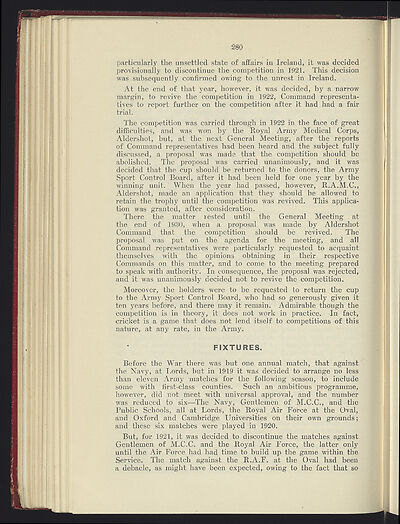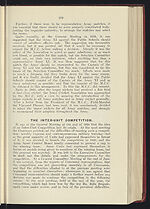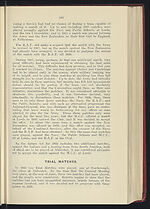1931
(294)
Download files
Complete book:
Individual page:
Thumbnail gallery: Grid view | List view

w-. �
280
i4
particularly the unsettled state of affairs in Ireland, it was decided
provisionally to discontinue the competition in 1921. This decision
was subsequently confirmed owing to the unrest in Ireland.
At the end of that year, however, it was decided, by a narrow
margin, to revive the competition in 1922, Command representa-
tives to report further on the competition after it had had a fair
trial.
The competition was carried through in 1922 in the face of great
difficulties, and was won by the Royal Army Medical Corps,
Aldershot, but, at the next General Meeting, after the reports
of Command representatives had been heard and the subject fully
discussed, a proposal was made that the competition should be
abolished. The proposal was carried unanimously, and it was
decided that the cup should be returned to the donors, the Army
Sport Control Board, after it had been held for one year by the
winning unit. When the year had passed, however, R.A.M.C.,
Aldershot, made an application that they should be allowed to
retain the trophy until the competition was revived. This applica-
tion was granted, after consideration.
There the matter rested until the General Meeting at
the end of 1930, when a proposal was made by Aldershot
Command that the competition should be revived. The
proposal was put on the agenda for the meeting, and all
Command representatives were particularly requested to acquaint
themselves with the opinions obtaining in their respective
Commands on this matter, and to come to the meeting prepared
to speak with authority. In consequence, the proposal was rejected,
and it was unanimously decided not to revive the competition.
Moreover, the holders were to be requested to return the cup
to the Army Sport Control Board, who had so generously given it
ten years before, and there may it remain. Admirable though the
competition is in theory, it does not work in practice. In fact,
cricket is a game that does not lend itself to competitions of this
nature, at any rate, in the Army.
FIXTURES.
Before the War there was but one annual match, that against
the Navy, at Lords, but in 1919 it was decided to arrange no less
than eleven Army matches for the following season, to include
some with first-class counties. Such an ambitious programme,
however, did not meet with universal approval, and the number
was reduced to six—The Navy, Gentlemen of M.C.C., and the
Public Schools, all at Lords, the Royal Air Force at the Oval,
and Oxford and Cambridge Universities on their own grounds;
and these six matches were played in 1920.
But, for 1921, it was decided to discontinue the matches against
Gentlemen of M.C.C. and the Royal Air Force, the latter only
until the Air Force had bad time to build up the game within the
Service. The match against the R.A.F. at the Oval had been
a debacle, as might have been expected, owing to the fact that so
280
i4
particularly the unsettled state of affairs in Ireland, it was decided
provisionally to discontinue the competition in 1921. This decision
was subsequently confirmed owing to the unrest in Ireland.
At the end of that year, however, it was decided, by a narrow
margin, to revive the competition in 1922, Command representa-
tives to report further on the competition after it had had a fair
trial.
The competition was carried through in 1922 in the face of great
difficulties, and was won by the Royal Army Medical Corps,
Aldershot, but, at the next General Meeting, after the reports
of Command representatives had been heard and the subject fully
discussed, a proposal was made that the competition should be
abolished. The proposal was carried unanimously, and it was
decided that the cup should be returned to the donors, the Army
Sport Control Board, after it had been held for one year by the
winning unit. When the year had passed, however, R.A.M.C.,
Aldershot, made an application that they should be allowed to
retain the trophy until the competition was revived. This applica-
tion was granted, after consideration.
There the matter rested until the General Meeting at
the end of 1930, when a proposal was made by Aldershot
Command that the competition should be revived. The
proposal was put on the agenda for the meeting, and all
Command representatives were particularly requested to acquaint
themselves with the opinions obtaining in their respective
Commands on this matter, and to come to the meeting prepared
to speak with authority. In consequence, the proposal was rejected,
and it was unanimously decided not to revive the competition.
Moreover, the holders were to be requested to return the cup
to the Army Sport Control Board, who had so generously given it
ten years before, and there may it remain. Admirable though the
competition is in theory, it does not work in practice. In fact,
cricket is a game that does not lend itself to competitions of this
nature, at any rate, in the Army.
FIXTURES.
Before the War there was but one annual match, that against
the Navy, at Lords, but in 1919 it was decided to arrange no less
than eleven Army matches for the following season, to include
some with first-class counties. Such an ambitious programme,
however, did not meet with universal approval, and the number
was reduced to six—The Navy, Gentlemen of M.C.C., and the
Public Schools, all at Lords, the Royal Air Force at the Oval,
and Oxford and Cambridge Universities on their own grounds;
and these six matches were played in 1920.
But, for 1921, it was decided to discontinue the matches against
Gentlemen of M.C.C. and the Royal Air Force, the latter only
until the Air Force had bad time to build up the game within the
Service. The match against the R.A.F. at the Oval had been
a debacle, as might have been expected, owing to the fact that so
Set display mode to:
![]() Universal Viewer |
Universal Viewer | ![]() Mirador |
Large image | Transcription
Mirador |
Large image | Transcription
| Games and sports in the army > 1931 > (294) |
|---|
| Permanent URL | https://digital.nls.uk/248675197 |
|---|
| Description | 'Games and Sports in the Army' was an annual publication produced by the British War Office between the 1930s and 1960s. This included the Second World War. It outlines the rules and regulations for games and sports played by members of the armed forces. It features names and photographs of team members, and examples of contemporary advertising. |
|---|---|
| Shelfmark | GWB.52 |

